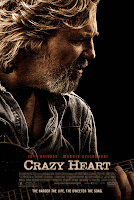 Sherlock Holmes
Sherlock HolmesWednesday, December 30, 2009
Holiday Reviews
 Sherlock Holmes
Sherlock HolmesWednesday, December 23, 2009
Reviews: Avatar & Me and Orson Welles
Friday, December 18, 2009
Commentary: 2009 Chicago Film Critics Nominations

Tuesday, December 8, 2009
Review: Invictus
 Hardball
HardballAgain, we have another film that the National Board of Review just devoured. While it didn’t claim the top Best Picture prize like Up in the Air did, it still managed to nab a shared Best Actor prize for Morgan Freeman as well as Best Director for Clint Eastwood. Now, this group is a big fan of Eastwood. Last year, this group gave him the Best Actor award for Gran Torino, and the year before he got Best Picture for Letters from Iwo Jima. I very much agreed with the latter, and violently disagreed with the former. Still, this group and I have that much in common when it comes to Mr. Eastwood: we both have a lot of respect for the guy. Still, we have another disagreement about a single film. They loved this one; I did not.
The film starts with Freeman’s Nelson Mandela and his recent release from a twenty-seven year prison sentence. Now he is the newly elected president of South Africa and is trying to accomplish the daunting task of uniting a country divided against the whites and the blacks. Mandela’s idea for unification is in the form of the country’s rugby team and their success of at the World Cup. Matt Damon is Francois Pienaar, the team’s captain who is pushing his team to an underdog victory.
The main reason, for me, why the film never quite gets to the point it needs to be is that the entire emotional crux of the film is based upon a game that I know nothing to very little about. The issue with this is that because most of the film's stakes rely on this premise, it's difficult to get into the emotional journey. Whenever something happens during the game, the only emotional cue to go on is the faces of the characters. After a while, you realize that movie is telling you how to feel instead of actually getting that emotional genuinely through the story. That emotional blockage goes away a little at the end with the climatic sports finale, but that is only because the end is relying on the many underdog/sport movie cliches.
My ignorance about rugby is an issue, but it's not an issue of the filmmaking. However, that's not the only problem the film presents. Anthony Peckham's script sidelines Mandela in his own movie, and turns what started out as an intriguing look at South African politics and the task of Mandela's challenges into a standard sports movie where the underdog triumphs in the end. The power of Mandela feels muted by the sports premise, and it is another misstep that causes the story to have a less emotional impact. It isn't a terribly written film (Gran Torino was), but it is one that doesn't feel like it has the right story in mind.
However, I will say that Eastwood shows us once again his versatility as a director. His approach is never flamboyant or flashy; it is stripped-down and grounded. His matter-of-fact way of directing is one that is seamless within any story, and there are even times when Eastwood allows us to become invested in either the sport scenes or the quiet emotional ones, like when the team visits the prison that held Mandela for almost thirty years. Though, I still don't think Eastwood has found effective use for his son Scott just yet, particularly when he gives him the character of the one who scored the winning goal for the team. Eastwood seems to have taken more time and effort with this film, and I am grateful for it.
Freeman is another actor that I have a lot of respect for, but I can't help but feel as if most of his roles now no longer require much stretch. It feels like the case here, but there are moments when you can see the good actor in Freeman coming out. The downfall is that his character doesn't feel like the center of this film. His screentime is the greatest, but the impact of the man is never really felt because of the story. Freeman gives a "good enough" performance as Mandela. The same goes to Damon, who most of the time treks through a harsh accent and shallow character. The only one here that really shines is Adjoa Andoh, who plays Mandela's chief secretary. She brings the right amount of energy and emotion to an ensemble that usually plays on one key.
There are a lot of things to admire in this film. I think Eastwood still shows that he's got a great eye behind the camera and allows you to somewhat get into the film. The performances for the most part are solid, though never mindblowing. There's also good work from Eastwood's regular cinematographer Tom Stern, and an upbeat score from son Kyle and Michael Stevens. But the film never finds the emotional ground needed to be a completely fulfilled movie. It's a great deal better than Eastwood's last film, but not quite there to be called one of his best. I guess this is just one more thing I disagree with the NBR with. **1/2 / ****; GRADE: B-
Sunday, December 6, 2009
Reviews: Up in the Air & Brothers
 Layover Fights
Layover Fights



